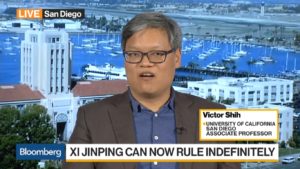
The arrest of HNA founder and group chairman Chen Feng, and CEO Tan Xiangdong, last week was yet another signal indicating a major change in China’s economic relations, based on guanxi or old-style relations between power brokers, says political analyst Victor Shih to Bloomberg.
Bloomberg:
Unlike the technology giants — whose success and control of big data have made them a target — HNA grabbed the government’s attention for a different reason. Under the leadership of Chen and Wang, the group took advantage of the easy credit that swirled in China in the twenty-teens to fund a raft of overseas acquisitions. Deals worth more than $40 billion included significant stakes in Deutsche Bank AG and Hilton Worldwide Holdings Inc., luxury properties such as golf courses, landmark hotels across six continents and the 648-foot skyscraper 245 Park Avenue in Manhattan.
When Beijing became aware of the risks of such capital flight and leverage, it started to clamp down on the big acquirers. The high-flying Anbang Insurance Group, owner of New York’s Waldorf Astoria hotel, was seized by the government in 2018. HNA’s slow-motion unraveling began soon after, with it shedding assets as debt repayments loomed. The group still faces at least $63 billion in claims from creditors.
“Chen shared the same strategy of many business people with political connections — they used their connections to borrow as much money as possible from state-owned financial institutions,” Victor Shih, an associate professor who specializes in Chinese financial policies and elite politics at the University of California San Diego, said in an interview before Chen’s detainment. “The way that these conglomerates used leverage to over-pay for overseas assets rapidly was not sustainable and resulted in catastrophic deleveraging.”
Debt was the foundation stone for Chen and Wang’s ambitions. Both devout Buddhists, they set their sights on HNA becoming one of the top companies in the Fortune 500. Credit-fueled expansion helped the conglomerate rise 183 spots to 170th by 2017, but also sealed its fate within months as debt ballooned to more than $93 billion the following year.
Victor Shih is a speaker at the China Speakers Bureau. Do you need him at your (online) meeting or conference? Do get in touch or fill in our speakers’ request form.
Are you looking for more political experts at the China Speakers Bureau? Do check out this list.
No comments:
Post a Comment